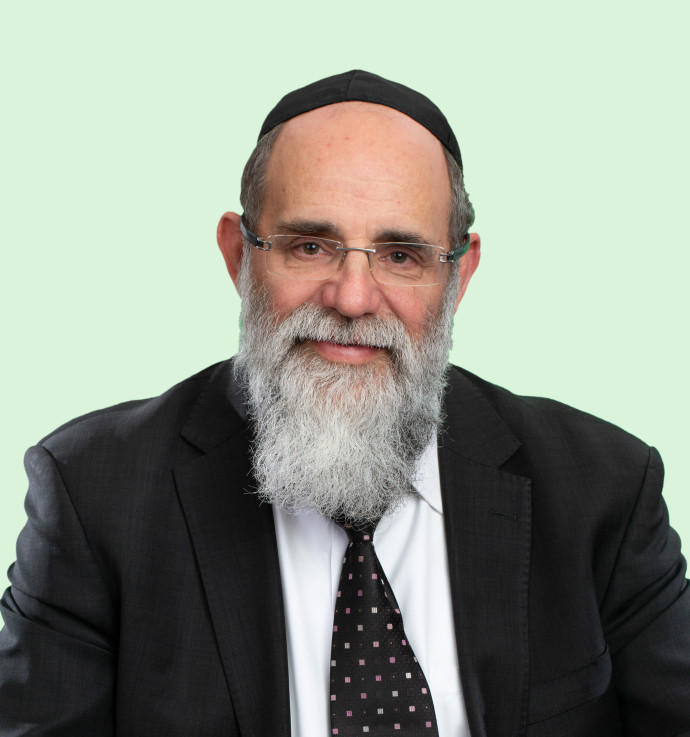The story of Shalva mirrors the story of the founding of the State of Israel. Seventy-five years ago, against seemingly insurmountable odds, the Jewish people, coming from different cultures and lands, struggled, overcame difficulties, found their place in the land of Israel, and built their home.
In a similar vein, Kalman and Malki Samuels who co-founded Shalva, meaning “peace of mind,” in 1990, came to Israel from foreign lands. They struggled to build Shalva into one of the world’s leading organizations of its kind, providing quality care for people with disabilities, empowering their families, and promoting social inclusion. This hard work involved overcoming the odds and the Samuels succeeded in building the Shalva National Center, which has provided lasting value for Israel’s citizens.
“The realization of the dream of Shalva,” says Samuels, “has had a tremendous impact, not only in Israel but around the world. Its influence has become global, and I say that humbly.”

During the pandemic, Shalva began to answer questions and help organizations from abroad remotely via Zoom.
“As a result of this experience,” says Samuels, “we learned to work and share everything we had, including various therapies, on Zoom. Shalva’s staff began helping organizations from abroad that were hungry for Shalva’s expertise.” The Shalva Institute, which now officially shares the knowledge that Shalva has accumulated over the past thirty-three years, was born. As a result, Shalva’s knowledge and understanding of supporting people with disabilities is spread worldwide.
Samuels notes that Shalva has received official status as a Consultant to the United Nations Economic and Social Council. This honorary recognition has enabled Shalva to increase its international impact as a leading advocate of inclusion and equality for people with disabilities.
On this Yom Ha’atzmaut, celebrating Israel’s independence, Samuels explains that “Shalva’s services benefit all sectors of Israel’s population through the entire life cycle - from helping families with their newborn babies to providing vocational training for adults and independent living in inclusive apartments.” He adds that the Shalva staff – more than 600 strong – is comprised of people from a wide variety of backgrounds. “We are a mix of both who we serve, and those who serve them,” says Samuels.
Since its inception, Shalva’s programs have centered on caring for all members of the families it serves and maintaining a good quality of life for everyone – not only the child with a disability. “If Mom and Dad are not doing well, it will be hard for that child to do well, independent of whether he has a lot of therapy or not,” explains Samuels. “But if Mom and Dad are functioning and have quality of life, there is a good shot that the family and the child will do well.”
This family-centered concept is first expressed in Shalva’s “Me and My Mommy” program for newborn infants and their mothers. Arriving just weeks after birth, infants with disabilities are guided to achieve their first developmental milestones through intensive parent-child therapy sessions. Parents struggling with the difficult reality of raising a child with disabilities receive professional guidance to cultivate fortitude and hope as co-therapists in their child’s rehabilitative process. “We very quickly help new mothers get back on their feet,” says Samuels, who adds that this program has become widely emulated.
Like the State of Israel, which experienced modest beginnings at its founding and is now acclaimed as the start-up nation, Shalva too has grown by leaps and bounds since it opened its doors in 1990 in a small Jerusalem apartment. Today, Shalva is housed in the spacious 12-story 220,000 square foot Shalva National Center, located in the heart of Jerusalem and perched above the new Route 16 highway entrance to Jerusalem. Here Shalva is an integral part of the Jerusalem Municipality’s planned innovation neighborhood.
The lovely, open atmosphere of the Shalva Center is intentional, Samuels states. “Marshall McLuhan, the famous Canadian philosopher of media, said that “the medium is the message. ”When visitors walk in the entrance, the beauty and colors of the three-story atrium envelop them and cause them to think about how significant it is to assure parents facing a new immense challenge that we are here to provide them with continued dignity and quality of life.
Each year, 150,000 visitors pass through Shalva’s National Center to learn more about Shalva’s comprehensive life-cycle programs, cutting-edge therapies, inclusive educational frameworks and social and recreational activities that have empowered families to raise their children with disabilities within the framework of the family. “Shalva is a game-changer,” says Samuels, “and we have greatly impacted the way the world addresses disabilities.”
Returning to the theme of the State of Israel and its accomplishments as it relates to Shalva, Samuels credits Israel’s Ministry of Welfare and Social Affairs for its assistance in partnering with the organization. “The social services offered in Israel are excellent,” says Samuels. “We are proud to be part of a very large system of social services that is outstanding. Israel can be proud of itself. Over the last thirty-three years, the progress that has been made in all areas of social services is phenomenal.”
As our interview comes to a close, Samuels recalls the meaningful words of Nir Barkat, former mayor of Jerusalem, who said that while Israel is praised as the start-up nation, Shalva serves as a paradigm of Israeli social start-ups. Shalva is a light unto the nations, said Barkat, which embodies the values of our prophets in helping the weakest members of our society.
Congratulations to the State of Israel on its 75th anniversary and to Shalva. May you both go from strength to strength.
